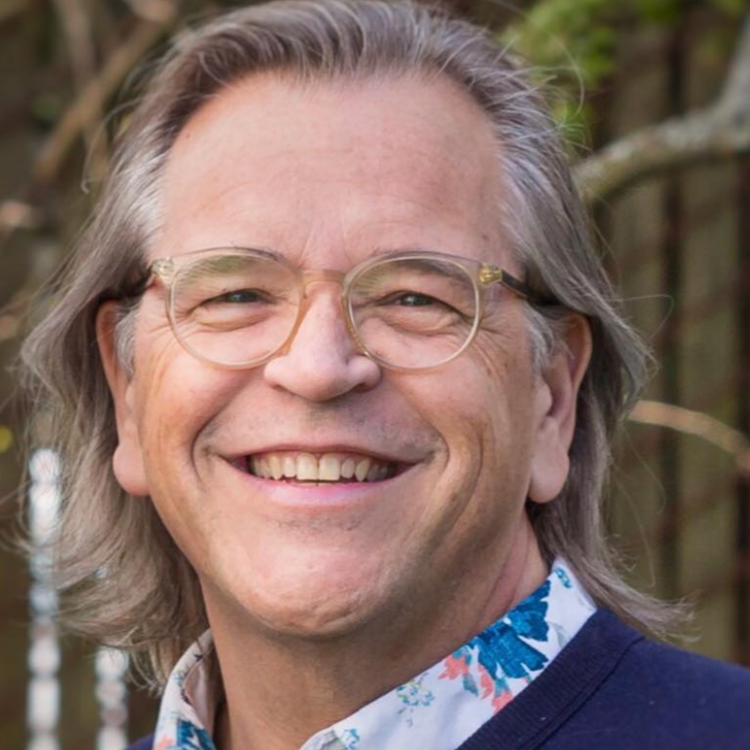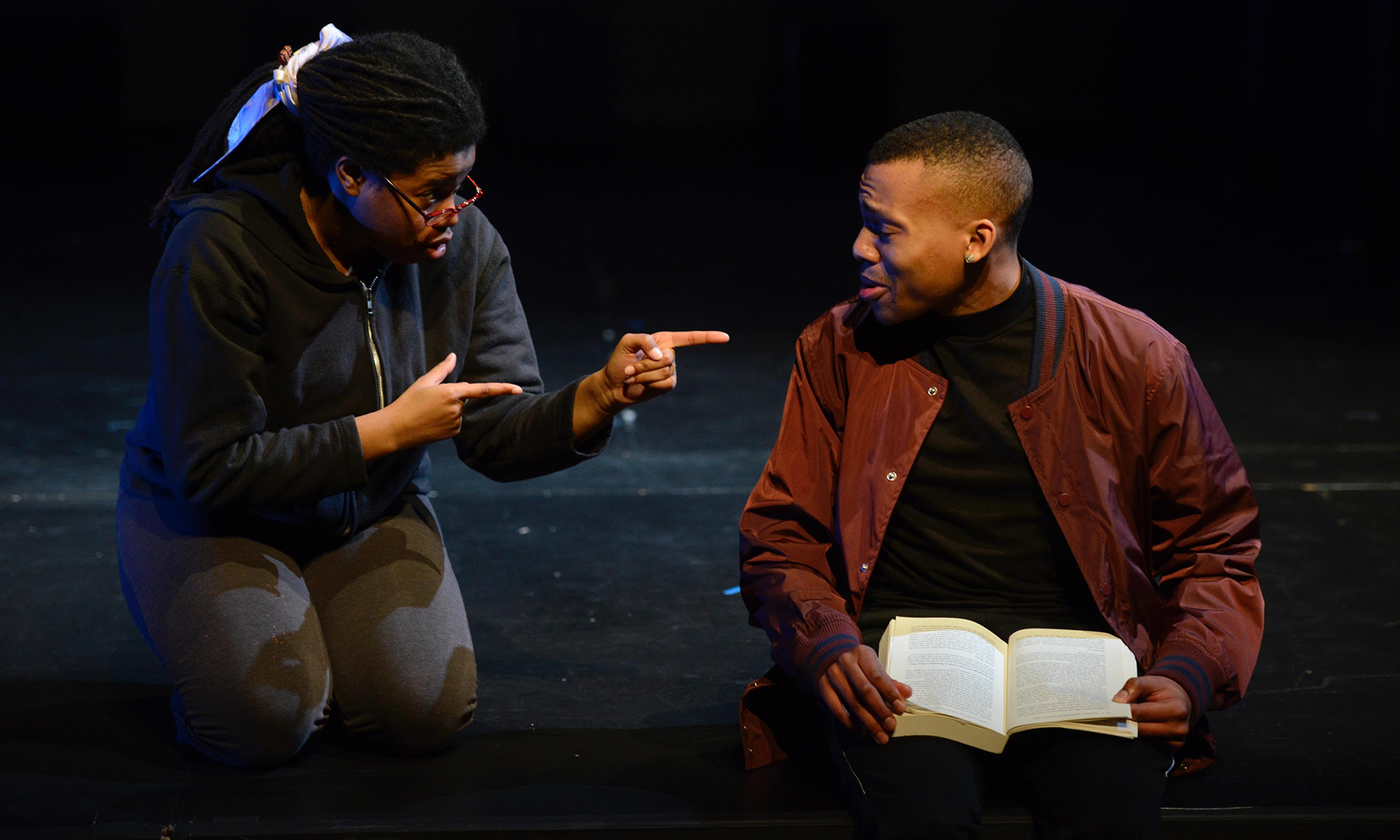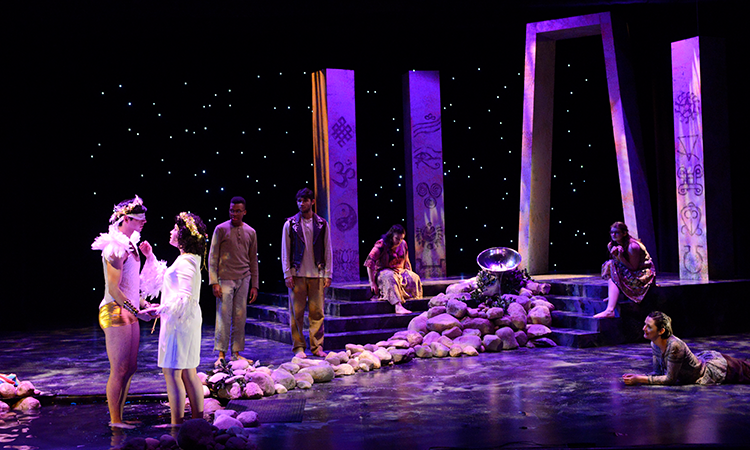How Change Begins
Such dialogue is part of the larger strategy by which BoCo’s theatre division hopes to transform itself into a more truly equitable program. The conservatory, which has been around for 153 years, was one of the first in the United States to admit African Americans and women, yet it was and is a primarily white institution (PWI). Though the number of students of color, as well as those who are gender nonconforming, has started to rise in recent years, the curriculum has not kept pace. A few faculty members began a movement to address this disparity.
Leading the charge was Theresa Lang, professor of theatre, who had first begun making anti-racism part of her practice a decade ago while still at Boston College. In 2018, she and fellow BoCo professor Jonathan Bailey Holland examined the racial and gender makeup of all artists (composers, librettists, choreographers, and playwrights) whose work had been performed at the conservatory in past seasons; the cumulative roster across the years was lopsidedly male and white. The duo pitched the notion of dramatically combatting that pattern by requiring that 51 percent of all artists conservatory-wide be from historically underrepresented populations. Their proposal didn’t fly, though the institution did commit to increasing gender parity and increasing the number of artists of color in all conservatory offerings.
Fear of “getting it wrong” is no small thing.
The theatre division decided to swing bigger, aiming for active inclusivity and what, at the time, it was calling “decolonizing” its syllabi. Patsy Collins Bandes, the department chair, felt they were at a point where they could either continue talking about doing the work or just jump in and start doing it. Starting in fall 2019, she says, they “implemented the expectation that at least 50 percent of the materials used in academic classes be written by underrepresented voices.” Every syllabus also now contains language about engaging with material outside of one’s own background and respectful practices for navigating that. Outside the classroom, the bar has been raised even higher: “After producing 98 percent men,” Collins Bandes says, “we are in the middle of producing our first season entirely written by women and people of color.”
Lang, Collins Bandes, and Scott Edmiston—the dean—put together a yearlong schedule of trainings and retreats to immerse the faculty in the work BoCo needs to do. This has included bringing in arts equity leaders, holding intimacy training, conducting workshops on inherent bias and inclusivity, hosting community forums on topics such as ethnicity in casting, and programming post-show talkbacks primarily featuring artists of color.
Brewer, an anti-racist theatre facilitator, director, and educator, was invited to help the faculty recognize bias and power play. She remembers feeling “how much more the faculty needed in terms of unpacking the harm they may have been causing.” In her response to the Raisin in the Sun question, she wanted people to gain a sense of agency when delving into culturally specific text, even when it’s not their own culture. “It’s okay to explore another’s lived experience with empathy and curiosity, and deep profound listening,” Brewer says. “And it’s okay not feeling comfortable.”
Brewer makes the case that the way to address this is to call things what they are: “It’s a problem to not say racism.”
Language Matters
Discomfort is one of the hiccups all of us in the BoCo community have encountered in the first year of this push. The learning curve has extended to every part of the process, starting with the language we use for what we’re doing.
“Decolonize” has been used in recent years to describe challenging entrenched power structures in educational settings, with the good goal of removing the default white and male lens. But every person of color I spoke to rejected the term, which has become too distanced from its origin in addressing the removal of Indigenous people from their land and the erasure of their cultures. As Eve Tuck and K. Wayne Yang wrote for the journal Decolonization: Education, Indigeniety & Society, “The metaphorization of decolonization makes possible a set of evasions … that problematically attempt to reconcile settler guilt and complicity, and rescue settler futurity.”
Brewer makes the case that the way to address this is to call things what they are: “It’s a problem to not say racism. You have to turn to face racism. Lacking clarity around an anti-racist policy allows it to persist, despite your intention.” When Michael J. Bobbitt, artistic director of New Repertory Theatre, came to speak on race and ethnicity in casting, he too described his work as anti-racist. It makes sense: the term has a clearer meaning and a more concrete call to action, which is vital to the situation at BoCo and similar PWIs.
Brewer created a framework she calls “Conscientious Theatre Training,” which is “dedicated to equitable anti-racist representation” while employing “purposeful inclusion of marginalized groups” and their “contributions to the canon of theatre.” Such a model also allows for attention to gender parity and the experience of students who are trans and gender nonconforming without diluting the power of anti-racist language. At the same time, Brewer’s use of the adjective “purposeful” (similar to BoCo’s use of “active”) to describe inclusion forestalls passivity.
A bunch of white people eternally talking about making change by themselves is a kind of white supremacy, but with better PR.
The Hard Work of Unlearning
The ongoing attempts to find the right language for this process reflects how much change is a necessary constant in this work. That is even more true when it comes to the curriculum itself. Collins Bandes notes that some professors are “resistant to changing the materials they have been teaching for twenty years.” Lang says “they’re committed to the idea but intimidated, and some are including new material just because they were told to.”
When teachers adapt a syllabus grudgingly, it shows. Sophomore contemporary theatre major Jordan Pearson notes: “Sometimes it feels force fed.” And when that happens, the result is the opposite of the intent. Students of color like Pearson can end up bearing the weight of the work. “‘Decolonizing,’ the way some have done it, is toxic. I feel tokenized. Students get asked to explain material and speak for a group. The school should make paid positions for us if it’s going to ask that.”
Lang recalls talking with a quartet of female students who said they had never felt as Black as they do at BoCo. “We have to stop expecting Black and brown students to re-experience trauma to educate our white students," Lang says. “How do you hold space that doesn’t sacrifice our Black and brown students for this?”
Her answer—and the one that BoCo is striving to live out—is that the whole educational process must be improved, not simply the material. Updating a syllabus is comparatively easy, but rewriting the system requires serious, focused, and multifaceted effort. As Pearson says, “If you want to make change effectively, you need to find different ways to do it.”
Anyone hoping to accomplish this must lay aside the fear of “getting of it wrong” and open themselves to a broader understanding of the challenges and opportunities ahead. At BoCo, this means listening to the voices we haven’t been hearing instead of trying so hard to act like we think we should. That’s what the Conscientious Theatre Training workshop and similar retreats have been about it, but that’s only a start.




Comments
The article is just the start of the conversation—we want to know what you think about this subject, too! HowlRound is a space for knowledge-sharing, and we welcome spirited, thoughtful, and on-topic dialogue. Find our full comments policy here
This essay is a wonderful example of the way we as a society still can’t find the difference between theater and real life. Not everything said on stage is what people actually think
I would like to offer a different perspective on the term decolonization. I am a POC of English and Indian descent and am very aware of the power of colonization to institutionalize racism in various parts of the world. The term invites us to connect our domestic fight against racism with similar struggles the world over. While I agree wholeheartedly that we need to have a language that addresses racism 'concretely' I am unclear how the term alleviates settler guilt and supports settler futurity.
I can’t speak for the authors I quoted, but I think the notion is that this term makes its own naming the end point; though it metaphorically ends colonization, it does nothing to meaningfully restore what was taken and is used primary by institutions still occupying colonized land. It allows the settlers and their descendants to feel good about the end of the colonial past while still profoundly benefiting from it, even as it marks them as progressive.
When I started this journey, I was all for the language, and I became less comfortable with it as I learned more from those who have seen plenty of signaling (in language and posture) but less actual meaningful, difficult action.
In India (and other places), however, perhaps the term becomes more valuable, because the colonized have restored self-rule, reclaiming land and institutions alike. Until that is true in the US, the term really just lingers as concept, not practice.
Hi Tina--I think it's great that you are trying to be mindful of who gets to tell the story and how. I really like some of the ideas in Daniel Jose Older's essay here (#3 and #8 are especially good when considering context beyond just the subject's own words). In all our work about lives not our own, the key thing listening to those for whom a culture is not research but life, so I hope your conversations with McFerren continue at every stage of the process.
Thanks. The conversations with McFerren were many years ago. When our current voting laws were undermined and new forms of suppression started ("Fooled Again" revealed many tactics in 2004) and I felt the importance of sharing his voice with others, particularly with white voters,, it was too late to find any of the volunteers who also met McFerren and who might be African American. So I wrote. But I learned what to do next time. Sandra Bland's voice started coming into my mind, asking "Why am I dead" - so instead of taking notes for a play, I contacted writer/actress Connie Winston (www.conniewinston.com), told her what I was hearing and she wrote a stunning play that connects Sandra Bland to the many recent unarmed dead Americans of color and with the first woman execelectrocuted in Georgia in the '40s for murdering her would-be rapist with his own gun. Connie acted her play at United Solo this year - "American Captives" -- and could perform it for your students...
Important issue - how to be open, inclusive and fair. I met an incredible African American WWII vet, John McFerren, in Fayette County TN. He returned from saving democracy unable to vote at home... and mobilized thousands of farmers and sharecroppers to register to vote, then sheltered hundreds of families evicted in 1960 for that "illegal" act. I wanted to give him voice on stage so that others can learn about him. But, because I'm white, I hesitated. No one stepped up who met him in similar events, including black volunteers.
Then I realized my fear of taking over a black hero's story meant he would stay unknown, silenced. And I should at least put to good use the white privilege of a good education and money to take playwriting courses, and family/community levels of awareness that made it possible for me to meet him. So I have written three plays that I hope bring him to life, mostly in his own words (short, one act and full length versions.) The short version has a reading Mar 2 in NYC with actor JR Carter (http://resumes.actorsaccess.c…) who admires the character and doesn't seem to care that a white girl captured him in writing. If he has good edits and wants to run with it, get productions, he can be a co-writer... as long as he doesn't get flack for collaborating.
With all the opportunities for unintended micro discriminations (each ethnic group, class, gender, etc). toward each other, I think we need to keep your 10 strategies in mind constantly - without losing the spontaneous exuberance of just sharing time on the planet together. And before we judge with blame or mince in shame, have the courage to ask, "Why?... "Why not?"